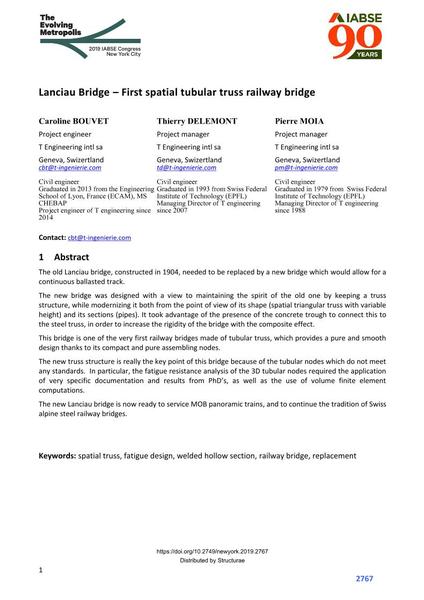Lanciau Bridge – First spatial tubular truss railway bridge

|
|
|||||||||||
Bibliographic Details
| Author(s): |
Caroline Bouvet
(T Engineering intl sa)
Thierry Delémont (T Engineering intl sa) Pierre Moïa (T Engineering intl sa) |
||||
|---|---|---|---|---|---|
| Medium: | conference paper | ||||
| Language(s): | English | ||||
| Conference: | IABSE Congress: The Evolving Metropolis, New York, NY, USA, 4-6 September 2019 | ||||
| Published in: | The Evolving Metropolis | ||||
|
|||||
| Page(s): | 2767-2772 | ||||
| Total no. of pages: | 6 | ||||
| DOI: | 10.2749/newyork.2019.2767 | ||||
| Abstract: |
The old Lanciau bridge, constructed in 1904, needed to be replaced by a new bridge which would allow for a continuous ballasted track. The new bridge was designed with a view to maintaining the spirit of the old one by keeping a truss structure, while modernizing it both from the point of view of its shape (spatial triangular truss with variable height) and its sections (pipes). It took advantage of the presence of the concrete trough to connect this to the steel truss, in order to increase the rigidity of the bridge with the composite effect. This bridge is one of the very first railway bridges made of tubular truss, which provides a pure and smooth design thanks to its compact and pure assembling nodes. The new truss structure is really the key point of this bridge because of the tubular nodes which do not meet any standards. In particular, the fatigue resistance analysis of the 3D tubular nodes required the application of very specific documentation and results from PhD’s, as well as the use of volume finite element computations. The new Lanciau bridge is now ready to service MOB panoramic trains, and to continue the tradition of Swiss alpine steel railway bridges. |
||||
| Keywords: |
fatigue design railroad bridge rail bridge replacement spatial truss welded hollow section
|
||||
